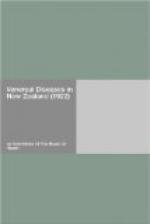(C.) Hospital and Charitable Institutions Act, 1913, Section 19.
In 1913 the need for detention provisions, to cover any infectious or contagious disease, received the attention of Parliament, and these are embodied in section 19 of the Hospitals and Charitable Institutions Act, 1913, thus:
“19. (1.) The Governor may from time to time, by Order in Council gazetted, make regulations for the reception into any institution under the principal Act of persons suffering from any contagious or infectious disease, and for the detention of such persons in such institution until they may be discharged without danger to the public health.
“(2.) Any person in respect of whom an order under this section is made may at any time while such order remains in force appeal therefrom to a Magistrate exercising jurisdiction in the locality, and the Magistrate shall have jurisdiction to hear such appeal and to make such order in the matter as he thinks fit. An order of a Magistrate under this subsection shall be final and conclusive.
“(3.) Regulations
under this section may be made to apply generally
or to any specified
institution or institutions.”
The Committee are advised that this section was not aimed solely at venereal diseases. In that year, and prior thereto, was prominent the difficulty of detaining consumptives who refused to take precautions to prevent the spread of their disease to others; and, again, much attention was being centred on the chronic typhoid and diphtheria “carrier.” It seemed rational to compel isolation of such persons in hospital until there was some assurance that they would no longer be a danger to the community if allowed their liberty. Regulations under the Act were not issued, owing to opposition manifested at the time, and consequently the section never became operative.
(D.) The Prisoners Detention Act, 1915.




